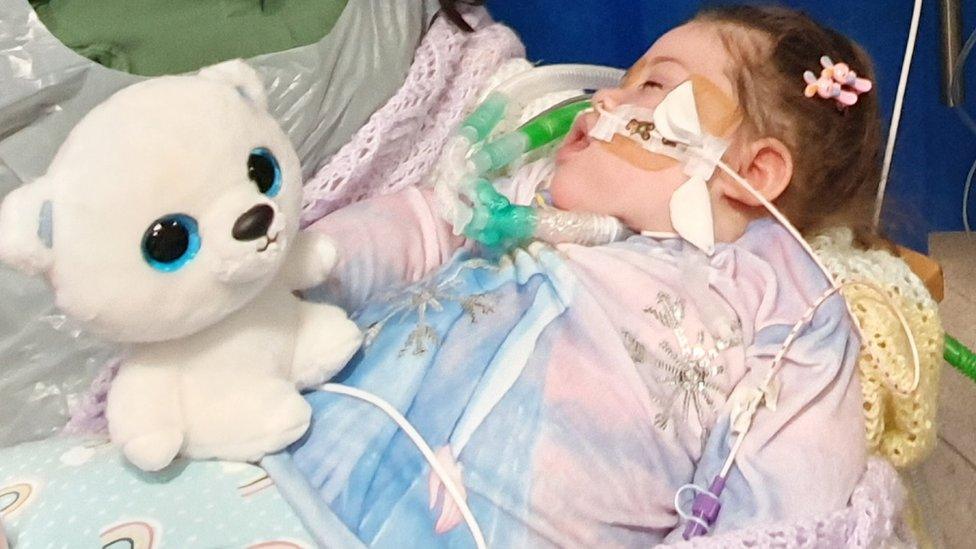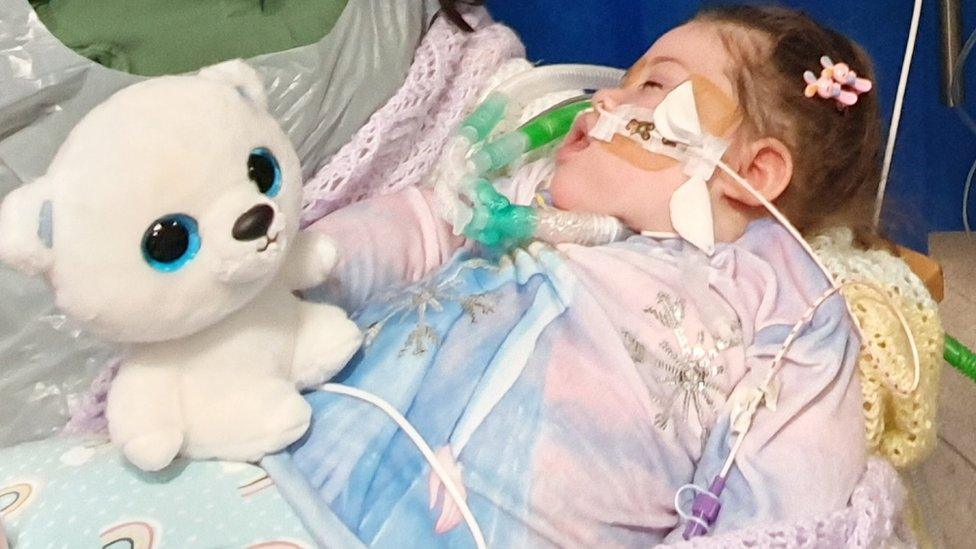Alta Fixsler: US visa granted to seriously ill Jewish girl
- Published

Alta's parents say palliative care is against their religion
The father of a seriously ill two-year-old girl has begged a hospital to let him take her to the United States for treatment after she was granted a visa.
Alta Fixsler's parents are in a legal dispute with Manchester University NHS Foundation Trust over her care.
Medics believe Alta has no chance of recovery but her parents say palliative care is against their religion and they should decide where she is treated.
The hospital trust said it would "continue to support" Alta's family.
In May, the High Court ruled that Alta, who suffered a brain injury at birth and cannot breathe or eat on her own, could be placed into palliative care or have her life-sustaining treatment withdrawn.
Alta's parents, who are Hassidic Jews, have challenged a ruling that withdrawing her treatment was in her "best interests".
They argue the hospital's plans are against their Jewish faith and their rights as parents.
Senior US politicians say Alta's American father should have the right to take her to his homeland.
The US State Department has now granted Alta a non-immigrant visa because of his US citizenship after cross-party campaigns.
"If the hospital cannot treat her just let us take her somewhere else," said Alta's father, who cannot be named because of a court order.
"She was only given a few hours to live when she was born and she is still here.
"It has been very tough especially as we have another child."
'Profoundly troubled'
Democrat Chuck Schumer, the Senate majority leader, wrote to the British Ambassador urging the UK to allow Alta to travel.
He called for all decisions over her treatment which are against the wishes of the family to be suspended "until Alta can travel to the USA".
Republican Senator Marco Rubio wrote to President Joe Biden with nine other politicians from his party,, external stating: "We are profoundly troubled that the child of an American citizen is being treated this way in a country with whom we have a deep alliance and special relationship."
The US State Department replied on the president's behalf to say "upholding the rights of US citizens" was the White House's "utmost priority".
"We recognise the profound implications of the outcome for Alta's family and loved ones," it added.
But a spokesman for the Foreign Office said the matter was for the courts to decide, independent of the government.
At the High Court in May, Mr Justice MacDonald said Alta had "no prospect of recovery" and stated her parents "cannot be criticised for having reached a different decision informed by the religious laws that govern their way of life, but applying the secular legal principles that I must I cannot agree with their assessment".
Alta's parents said they intended to take their fight to get Alta to the US to the Supreme Court.
"If we have to, we will go to the European Court of Human Rights," her father added.
Manchester University NHS Foundation Trust said it recognised that "this is an incredibly difficult and distressing time for Alta's family and we will continue to support them".
It said its consultants and "external expert opinions" had reached a consensus "with which the High Court and now the Court of Appeal has agreed... that very sadly it is in Alta's best interests for life-sustaining treatment to be withdrawn".
A spokesman added that due to patient confidentiality and a Supreme Court appeal, "it would inappropriate to comment further".

Why not follow BBC North West on Facebook, external, Twitter, external and Instagram, external? You can also send story ideas to northwest.newsonline@bbc.co.uk
Related topics
- Published9 June 2021

- Published28 May 2021

- Published20 May 2021

- Published19 May 2021
